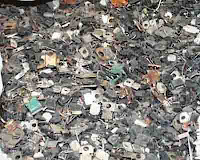China: Recycling computer ciruit boards

New Scientist, a UK magainze that I like, notes that Chinese researchers have found a clever way of recycling printed circuit boards.
These boards are made from insulating layers of fibreglass and resin (glue) with electronic components and interconnecting circuitry on top. Full of toxic chemicals and heavy metals, in other words.
The number of boards being manufactured worldwide is growing with China and Taiwan alone producing more than 200 million square metres each year. They are in your mobile phone, your computer, your elevator, your car - - yup, anywhere you expect something fancy to happen when you press a button. However, only a small numbers of these circuit boards are recycled:
They are typically put into copper smelters, which risks releasing harmful toxic fumes. Most circuit boards are simply incinerated or thrown into landfill, which releases toxic pollutants such as heavy metals and dioxins into groundwater and the atmosphere.
Researchers from Shanghai Jiao Tong University, China, believe their recycling solution could reduce these problems. It involves crushing boards and using a high-voltage electric field to separate metallic and non-metallic materials. The metals can then be reclaimed by distilling in a vacuum while the non-metal components can be compacted into plates for use as building materials.
A machine with rotating cutters crushed the boards and a hammer grinder pulverised them into pieces smaller than 1millimetre in diameter.
This process detached the metallic and non-metallic components from the boards. The large difference in their electrical conductivity meant they could then be separated using a high-voltage electric field.
So, why isn't all electronic scrap treated this way??
New Scientist: 'Crush and zap' recycles circuit boards more cleanly
Trade in electronic waste is supposedly controlled by the UNEP Basel Convention. Japan ratified this international convention in 1993. Read all about this important global environmental agreement here.
(Photo from Umicore)

Comments
Why am I NOT surprised that the USA has not ratified the Basel Convention?